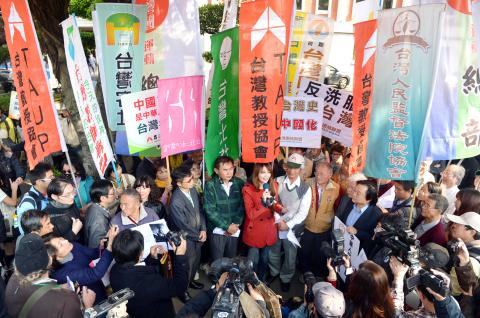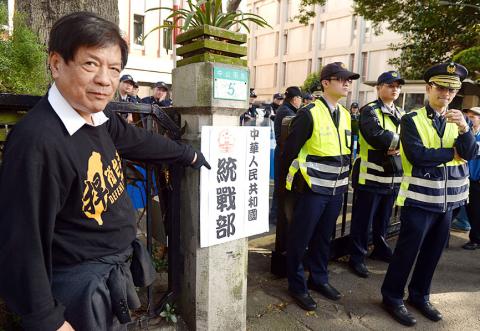Groups yesterday protested the Ministry of Education’s bid to “slightly adjust” the national high-school curriculum, calling the move part of a “brainwashing” policy that would see the new curriculum reflect a more China-oriented perspective.
Despite the groups’ opposition, the ministry later formally approved a new curriculum on Chinese literature and social sciences.
“Taiwanese have fought long and hard to reach a stage where there is much less political influence on our education, so it is therefore unacceptable that the government under the leadership of President Ma Ying-jeou [馬英九] is making an U-turn on this progress,” Jim Lee (李筱峰), a professor at National Taipei University of Education’s Graduate School of Taiwanese Culture, told a rally in front of the ministry in Taipei.

Photo: Wang Yi-sung, Taipei Times
“The so-called ‘slight adjustment’ is not slight at all, it’s a fundamental and dramatic change from a Taiwan-oriented perspective to a China-oriented perspective in education,” Lee added.
Saying that the current curriculum is “too friendly” when it comes to describing the period when Japan controlled Taiwan and unconstitutional when describing China, ministry officials and members of its curriculum outlines adjustment task force have proposed calling the era of Tokyo’s rule the “Japanese colonial period” and referring to “China” as “Mainland China” in textbooks.
They also proposed making adjustments to the description of the period when the nation was under the Chinese Nationalist Party’s (KMT) authoritarian regime.

Photo: Wang Yi-sung, Taipei Times
“I am totally opposed to replacing Taiwan’s perspective for China’s in our nation’s history classes,” National Taipei University student Lai Pin-yu (賴品妤) said. “Taiwanese history can be neither Chinese history, nor KMT history.”
National Taiwan University history professor Chen Tsui-lien (陳翠蓮) criticized the government for making such dramatic changes clandestinely.
“These are major alterations and therefore require more public participation,” she said.
As the groups protested outside the ministry, another group of demonstrators led by the Alliance of Referendum for Taiwan tried to block the entrance to the National Academy for Educational Research (NAER), where the curriculum task force was meeting.
“We’re here to stop the task force from making rash decisions without consulting the public,” alliance convener Tsay Ting-kuei (蔡丁貴) said. “This is such a controversial issue, it should not be decided without having more public discussions — especially when NAER vice president Tzeng Shih-jay [曾世杰] promised us on Friday that he would organize public hearings before making any decisions.”
The protesters briefly stopped some task force members from entering the building, but were removed by police after severe clashes.
The ministry said the changes are based on the 12-year national education system, which is set to be implemented in August, and aimed at achieving better continuity between junior-high and senior-high school textbooks.
After reviewing the curriculum on literature and social sciences, the ministry said it would next review health and physical education.
The Democratic Progressive Party (DPP) condemned the ministry for not halting the initiative.
“The ‘adjustment’ of the curriculum outlines is not an adjustment, but a total overhaul,” DPP spokesperson Xavier Chang (張惇涵) said.
The ministry’s changes “seriously conflict” with most people’s understanding about the nation’s history and geography, Chang said, adding that more than 85 percent of respondents in a DPP opinion poll say that the country’s territory includes Taiwan, Penghu, Kinmen and Matsu, but not “mainland China.”

The CIA has a message for Chinese government officials worried about their place in Chinese President Xi Jinping’s (習近平) government: Come work with us. The agency released two Mandarin-language videos on social media on Thursday inviting disgruntled officials to contact the CIA. The recruitment videos posted on YouTube and X racked up more than 5 million views combined in their first day. The outreach comes as CIA Director John Ratcliffe has vowed to boost the agency’s use of intelligence from human sources and its focus on China, which has recently targeted US officials with its own espionage operations. The videos are “aimed at

STEADFAST FRIEND: The bills encourage increased Taiwan-US engagement and address China’s distortion of UN Resolution 2758 to isolate Taiwan internationally The Presidential Office yesterday thanked the US House of Representatives for unanimously passing two Taiwan-related bills highlighting its solid support for Taiwan’s democracy and global participation, and for deepening bilateral relations. One of the bills, the Taiwan Assurance Implementation Act, requires the US Department of State to periodically review its guidelines for engagement with Taiwan, and report to the US Congress on the guidelines and plans to lift self-imposed limitations on US-Taiwan engagement. The other bill is the Taiwan International Solidarity Act, which clarifies that UN Resolution 2758 does not address the issue of the representation of Taiwan or its people in

US Indo-Pacific Commander Admiral Samuel Paparo on Friday expressed concern over the rate at which China is diversifying its military exercises, the Financial Times (FT) reported on Saturday. “The rates of change on the depth and breadth of their exercises is the one non-linear effect that I’ve seen in the last year that wakes me up at night or keeps me up at night,” Paparo was quoted by FT as saying while attending the annual Sedona Forum at the McCain Institute in Arizona. Paparo also expressed concern over the speed with which China was expanding its military. While the US

SHIFT: Taiwan’s better-than-expected first-quarter GDP and signs of weakness in the US have driven global capital back to emerging markets, the central bank head said The central bank yesterday blamed market speculation for the steep rise in the local currency, and urged exporters and financial institutions to stay calm and stop panic sell-offs to avoid hurting their own profitability. The nation’s top monetary policymaker said that it would step in, if necessary, to maintain order and stability in the foreign exchange market. The remarks came as the NT dollar yesterday closed up NT$0.919 to NT$30.145 against the US dollar in Taipei trading, after rising as high as NT$29.59 in intraday trading. The local currency has surged 5.85 percent against the greenback over the past two sessions, central